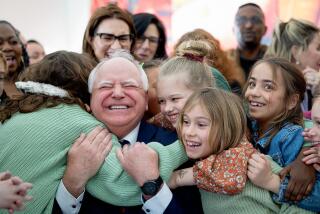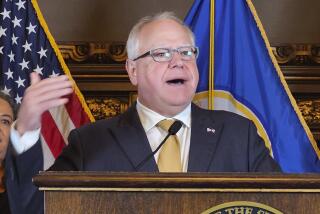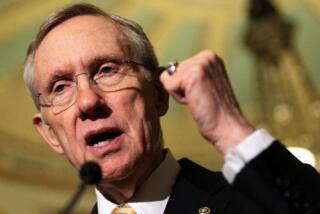Dukakis Scores Victories in Nebraska, W. Virginia
- Share via
CHARLESTON, W. Va. — Massachusetts Gov. Michael S. Dukakis notched big triumphs in the West Virginia and Nebraska primaries Tuesday, adding to the monthlong victory streak that has smoothed his path toward the Democratic presidential nomination.
With 53% of West Virginia’s precincts reporting, Dukakis led his lone rival, the Rev. Jesse Jackson, 79% to 14%.
In Nebraska, Dukakis led Jackson 63% to 26% with 88% of the precincts reporting.
Victories in the two states meant that Dukakis has won eight of the last nine primaries, losing to Jackson only in the District of Columbia contest last week.
The victories also added to his delegate lead heading into the showdown vote in California on June 7. Dukakis was winning an estimated 54 of the 62 delegates at stake Tuesday. Before the voting began, the Associated Press reported that Dukakis had 1,525 delegates, contrasted with 935 for Jackson, with 2,081 needed to nominate.
Vice President George Bush, who has already locked up the Republican presidential nomination, also chalked up huge victories in both states. He was winning 71% of the Republican votes in Nebraska, with the balance going to Kansas Sen. Bob Dole, who has dropped out of the race. Bush was winning 89% of the vote in West Virginia.
Dukakis said the victories are “a major step on the road to the nomination.” Speaking at Marymount Manhattan College in New York after raising $70,000 at a private event Tuesday night, Dukakis said that “our goal” is to wrap up the nomination by June 7. He said that he hoped to meet privately with Jackson once or more before then but that he would not spend “any time thinking about or seeking out” a running mate until after the California primary.
The votes Tuesday reflect “a desire on the part of the American people for change, for fundamental change, for a very different kind of presidential leadership than we’ve had the past seven or eight years,” he said.
Jackson once again vowed to continue. He said his campaign “will continue with great fervor through June 7. . . . We will take it all the way to the end.”
Speaking to reporters in Portland, Ore., site of a primary next week, he stressed the importance of shaping the campaign debate, saying that “the winner cannot just be the absence of Reagan,” but rather, “a new direction.”
‘The Right Thing’
“I keep that challenge alive because it is the right thing to do.”
Jackson had spent more time and money than Dukakis in both West Virginia and Nebraska but his campaign had trouble making inroads in states where voters were preoccupied with the local contests--a bitter gubernatorial race in West Virginia and a tight Republican Senate primary in Nebraska.
In those races, West Virginia Gov. Arch A. Moore Jr. led Morgantown millionaire John Raese in the Republican primary 52.7% to 47.3%. On the Democratic side, insurance executive Gaston Caperton led former House of Delegates Speaker Clyde See 39.2% to 26.7%.
In Nebraska, Sen. David Karnes defeated Rep. Hal Daub after a bitter, divisive Republican Senate primary campaign, and former Gov. Bob Kerrey easily won the Democratic nomination for the Senate.
Spent Little Time
Dukakis devoted less than 24 hours combined to West Virginia and Nebraska. Aides said his campaign spent less than $50,000 on television advertising in the two states. Jackson spent parts of two days in West Virginia and parts of three in Nebraska.
In West Virginia, Dukakis profited from a flurry of last-minute endorsements from the state’s Democratic leaders and a nod of support from Richard Trumka, the powerful president of the 60,000-member United Mine Workers.
“As soon as we got here we got on the phone with every elected official in the state,” said Michael Whooley, Dukakis’ state director. “People take their politics very personally here. When they see the county commissioner, whom they like, support Dukakis, they figure, ‘There’s got to be something there.’ ”
Aided by N.Y. Victory
Dukakis ultimately won the backing of Sally K. Richardson, the state Democratic chairwoman, 35 of 55 Democratic county chairmen and a horde of elected officials. But the movement toward Dukakis did not begin until his overwhelming victory in the New York primary knocked Tennessee Sen. Albert Gore Jr. out of the race, eliminating the rival that Dukakis supporters in West Virginia had most feared.
“New York helped a lot,” said Debbie Phillips, Dukakis’ state chairwoman here. “With Gore still in it, I think we would have had a horse race here.”
The presidential contest in West Virginia was overshadowed by the local races and by concerns that Election Day might be marred by the kind of corruption that is legion in West Virginia’s political history.
Grand juries were impaneled Tuesday in three West Virginia counties as a deterrent to the kind of vote-buying that led in 1986 to indictments of officeholders in Mingo County.
Vote-Buying Charges
In the race for the governorship, Moore was trying to overcome charges, broadcast Sunday night on NBC, that he tried to buy votes in Mingo County in his first successful gubernatorial campaign in 1972. Raese used the report for all it was worth as he wrapped up his campaign.
The Democratic battle to take on the Republican nominee remained bitter until the very last, with each candidate accusing the other of making false allegations.
Millionaire Caperton portrayed himself as a “breath of fresh air, above the good-old-boy politics,” while See, a longtime West Virginia politician, described the contest as “between the rich, the powerful and the privileged, and those who want to make West Virginia a better place to live.”
In the U.S. Senate campaign in West Virginia, Senate Majority Leader Robert C. Byrd won an easy victory over challenger Bob Myers, a businessman from Huntington. Byrd faces a general election runoff against Republican nominee Jay Wolfe, a state senator who defeated Bernie Lumbert, a welfare recipient.
Youngest Senator
In Nebraska, Karnes, the nation’s youngest senator at 39, was seeking his first elective victory after being appointed to the office 14 months ago.
Karnes was a political unknown when Republican Gov. Kay A. Orr appointed him after Edward Zorinsky’s death. Daub, 47, was one of several GOP regulars who lobbied for the job and he acknowledged bitterness at being passed over despite having “carried water for the elephant for 20 years.”
Despite Dukakis’ landslide victory, the exact fate of West Virginia’s 37 delegates at stake Tuesday was expected to take a few days to sort out.
System Criticized
That is the result of a system, roundly criticized again Tuesday by the Jackson campaign, which is effectively winner-take-all, providing a candidate who wins a majority in each congressional district the opportunity to win all of its delegates.
Twenty-four delegates were directly elected Tuesday from four congressional districts. Thirteen more delegates are to be apportioned early next month on the basis of the earlier delegate distribution. West Virginia also sends seven so-called super delegates to the convention.
But West Virginians do not always vote the straight presidential ticket on the delegate ballot. In 1980, most of those elected had names beginning with A, B and C--the result of a ballot in which delegates were listed alphabetically.
Long, Tangled Ballot
This year, although the names have been reshuffled, voters faced a long and tangled ballot, which party officials said would make it likely that some delegates would win election on the basis of name recognition alone, not on which candidate they support.
In anticipation of an almost-total Dukakis sweep, however, Jackson’s state chairman, Arley Johnson, said Tuesday that the campaign would demand a share of the at-large delegates at least equal to the percentage of popular votes won by Jackson. And Gerald F. Austin, Jackson’s national campaign manager, said it was time for states that ask voters to elect delegates directly to instead allocate the delegates based on the popular vote.
But Richardson, the Democratic chairwoman in West Virginia, echoing an argument made by national party officials, said: “The rules are the rules, and they’ve known that from the beginning.”
Jackson supporters interviewed in West Virginia in the days before the election had shown little optimism that he might win either the primary or the nomination but they said they believed it important for him to win enough delegates to shield him from “dirty tricks” at the Democratic National Convention.
Staff writers Karen Tumulty in Portland and Bob Drogin in New York contributed to this story.
DEMOCRATIC VOTEWest Virginia 1,132 of 2,151 precincts reporting--53%.
37 convention delegates at stake.
Vote Pct. Delegates Dukakis 124,333 79 36 Jackson 21,947 14 0 Others 11,437 7 1
Nebraska 1,644 of 1,870 precincts reporting--88%.
25 convention delegates at stake.
Vote Pct. Delegates Dukakis 93,194 63 18 Jackson 38,851 26 7 Others 16,620 11 0
More to Read
Get the L.A. Times Politics newsletter
Deeply reported insights into legislation, politics and policy from Sacramento, Washington and beyond. In your inbox twice per week.
You may occasionally receive promotional content from the Los Angeles Times.










